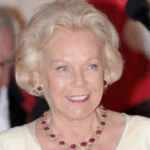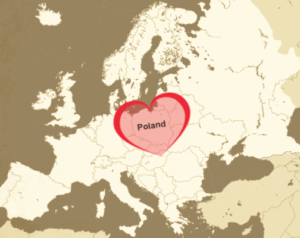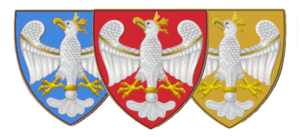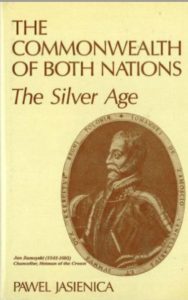During the academic year 2018-19, UVA’s Center for Russian, East European and Eurasian Studies organized five events as part of the Polish Lecture Series at UVA sponsored by The American Institute of Polish Culture (AIPC). The highlight of the year was a visit from Poland’s ambassador to the US, Dr. Piotr Wilczek on March 29. Dr. Wilczek was accompanied by three other ambassadors from the Visegrád Group of countries: Hynek Kmoníček of Czechia, Ivan Korčo of Slovakia, and Dr. László Szabó of Hungary. This was the first time all four Visegrád ambassadors had appeared together in the US, as well as the first time multiple ambassadors had visited the University of Virginia as a group. The four ambassadors spoke to a packed house at the Batten School of Leadership and Public Service, sharing their Perspectives on the US and Europe. The 200-person crowd included AIPC’s Vice President Dr. Michel Pawlowski and Robert Joskowiak, the Honorary Consul of the Republic of Poland in Virginia. The visit was co-sponsored by CREEES, the Batten School, the Miller Center of Public Affairs, the Program in European Studies, and the Woodrow Wilson Department of Politics.
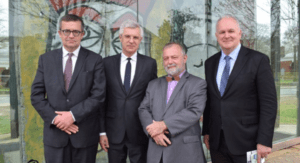
It was one of the largest events in the fourteen-year history of the Polish Lecture Series at UVA. The Spring 2019 semester featured three talks related to this year’s Series theme, Crossing Borders. All three were organized by CREEES and co-sponsored by the Corcoran Department of History and the Department of Slavic Languages and Literatures. The Series kicked off on February 28 with a presentation by Dr. Keely Stauter-Halsted, the Hejna Family Chair of Polish Studies and Professor of History in the University of Illinois at Chicago. Dr. Stauter-Halsted is the author of two award-winning books on partitioned Poland, The Nation in the Village: The Genesis of Peasant National Identity in Austrian Poland, 1848-1914 (Cornell, 2001) and The Devil’s Chain: Prostitution and Social Control in Partitioned Poland (Cornell, 2015). At UVA, she spoke about her new project, “Internal Frontiers: Citizen Denunciations and the Construction of Belonging in the Polish Second Republic, 1918-1923.” The presentation attracted nearly forty students, faculty, and community members, including Dr. Pawlowski.
Our next presentation came on April 1, from Dr. Patryk Babiracki, Associate Professor of History in the University of Texas at Arlington. Dr. Babiracki is the author of Soviet Soft Power in Poland: Culture and the Making of Stalin’s New Empire, 1943-1957 (UNC, 2015) along with two edited volumes about culture and travel in the Soviet Bloc. His talk was entitled “The Prussian Origins of Polish Socialism: The Upper Silesia Tower and the Poznań International Fair, 1911-1959.” Through the story of Poznań’s Upper Silesia Tower, Dr. Babiracki made the case for a vision of Polish national identity based on internationalism rather than martyrdom. Roughly thirty people were in attendance.
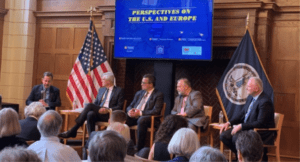
A week later, on April 8, the Series organized a special roundtable about Polish Politics on the World Stage. The roundtable was initially scheduled for mid-February but had to be postponed due to a snowstorm, and thankfully, all three participants were still able to present in April. They included UVA’s own Stephen Mull, currently the Vice Provost for Global Affairs and previously US ambassador to Poland from 2012-15; Dr. Aleksandra Sznajder Lee, Associate Professor of Politics at the University of Richmond and the author of Transnational Capitalism in East Central Europe’s Heavy Industry: From Flagship Enterprises to Subsidiaries (Michigan, 2016); and Dr. Krzysztof Jasiewicz, the Stephen P. Ames, Jr. Professor in Sociology and Anthropology at Washington and
Lee University, who serves as editor of East European Politics and Societies, the leading journal in the field. The three speakers addressed Poland’s current political climate, the country’s relationship with the US, and its role within the European Union. Despite the rescheduled date, some twenty students and faculty members were able to attend.
Finally, on March 5, the Polish Lecture Series co-organized a film screening with UVA’s Program in European Studies. The film we chose to show was Cold War (Zimna Wojna, Poland 2018) directed by Paweł Pawlikowski. Cold War earned three nominations at the 91st Academy Awards, including Best Foreign Film and Best Director. At the Cannes Film Festival, where the film premiered, it earned Pawlikowski the Best Director award. Our screening was remarkably well attended, attracting over fifty people. We plan to continue the tradition of film screenings next year in collaboration with the recently formed Polish Students Association at UVA.
None of these events would have been possible without the generous support of Lady Blanka Rosenstiel and The American Institute of Polish Culture. We are extremely grateful for their continued help and look forward to further collaboration!
Article author Kyrill Kunakhovich


